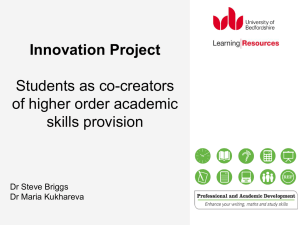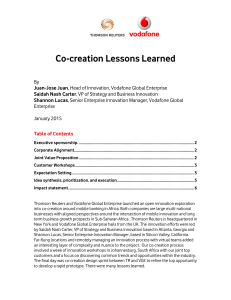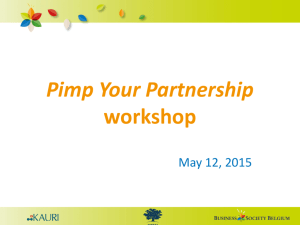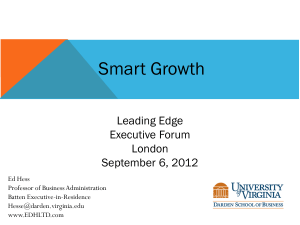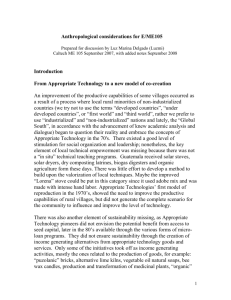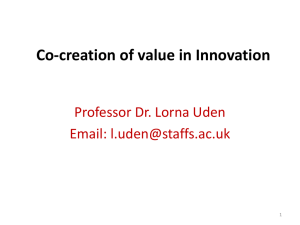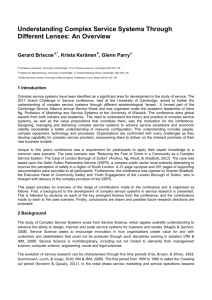E. Panteleeva_Customer Experience Management
advertisement
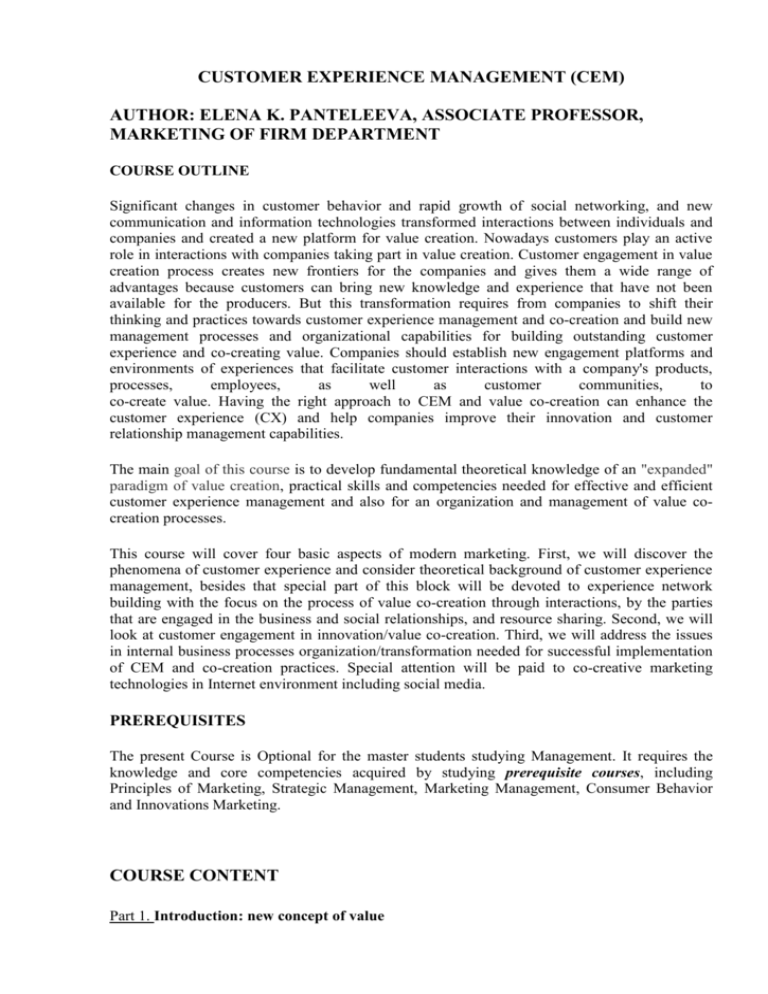
CUSTOMER EXPERIENCE MANAGEMENT (CEM) AUTHOR: ELENA K. PANTELEEVA, ASSOCIATE PROFESSOR, MARKETING OF FIRM DEPARTMENT COURSE OUTLINE Significant changes in customer behavior and rapid growth of social networking, and new communication and information technologies transformed interactions between individuals and companies and created a new platform for value creation. Nowadays customers play an active role in interactions with companies taking part in value creation. Customer engagement in value creation process creates new frontiers for the companies and gives them a wide range of advantages because customers can bring new knowledge and experience that have not been available for the producers. But this transformation requires from companies to shift their thinking and practices towards customer experience management and co-creation and build new management processes and organizational capabilities for building outstanding customer experience and co-creating value. Companies should establish new engagement platforms and environments of experiences that facilitate customer interactions with a company's products, processes, employees, as well as customer communities, to co-create value. Having the right approach to CEM and value co-creation can enhance the customer experience (CX) and help companies improve their innovation and customer relationship management capabilities. The main goal of this course is to develop fundamental theoretical knowledge of an "expanded" paradigm of value creation, practical skills and competencies needed for effective and efficient customer experience management and also for an organization and management of value cocreation processes. This course will cover four basic aspects of modern marketing. First, we will discover the phenomena of customer experience and consider theoretical background of customer experience management, besides that special part of this block will be devoted to experience network building with the focus on the process of value co-creation through interactions, by the parties that are engaged in the business and social relationships, and resource sharing. Second, we will look at customer engagement in innovation/value co-creation. Third, we will address the issues in internal business processes organization/transformation needed for successful implementation of CEM and co-creation practices. Special attention will be paid to co-creative marketing technologies in Internet environment including social media. PREREQUISITES The present Course is Optional for the master students studying Management. It requires the knowledge and core competencies acquired by studying prerequisite courses, including Principles of Marketing, Strategic Management, Marketing Management, Consumer Behavior and Innovations Marketing. COURSE CONTENT Part 1. Introduction: new concept of value Customer experience phenomena: what is CX? Customer experience: physical and emotional aspects. Psychology of customer experience. Experience economy and experience marketing. From traditional concept of value creation to value co-creation concept. Customer value concept: economic and marketing viewpoints. Prerequisites for the new concept of value. Changing role of customers. “Customer-firm” interaction. Transformation of the value creation process. Comparative analysis of traditional system of value creation and value co-creation system. From traditional to co-creative strategy. Part 2. Customer experience management (CEM) CEM framework. Customer experience mapping. Tracking customer experience along touchpoints. Research techniques and empirical results of customer experience tracking. Building the experiential platform. Organizational requirements for CEM. Measuring customer experience. Customer Experience Pyramid. Part 3. Value co-creation process New age of innovation. The transformation of business models in different industries. Measuring value co-creation impact on business performance: monetary, social, emotional and communicative effects. Components of co-creation. Typology of co-creative activities. Cocreation workshops, mass customization, crowdsourcing, open innovation, user generated content (UGC). The co-creation approach to process design. Stages of co-creation in new product development (NPD) process: from ideation to post-launch. Measures and KPIs of innovation/co-creation success. Part 4. Co-creation experience Conditions and mechanisms of co-creation experience. The range of co-creation experience. Types of customer experience in virtual customer environments. Experience personalization. Moving from customization to experience personalization. From Total quality management (TQM) to experience quality management (EGM). Experience audit. Co-creation of expectations and experience. Part 5. Building infrastructure for co-creation of value Building blocks of co-creation: dialog, access, risk-benefits, transparency (DART) and their combinations for new opportunities creation. Technical and social infrastructure for innovation/co-creation. Experience networks. The role of a focal firm in value co-creation process. Organizational problems in building experience networks. Part 6. Building co-creation capabilities and managing internal processes of stakeholders engagement Co-creation capabilities. Distribution of capabilities within experience networks. Creating the new competitive landscape. Building an interactive internal environment: knowledge orientation, an infrastructure for knowledge creation and dissemination, the role of project teams. Internal business processes transformation. Part 7. Customer communities and social media marketing (SMM) Moving from traditional concept of market to the ‘market as a forum’ concept. Types of customer communities. Customer roles in virtual customer environments (VCE), and factors determining them. Strategies to enhance the customer experience. Social media: definition and basic characteristics. What is social media marketing? Social media as a new model of customer-firm interaction. Tendencies of social media development: international trends and Russian practice. Social media classifications. Social media engagement stages of maturity. Social media experience: personal, social, business. Value indicators of social media experience. Factors driving and destroying the value of social media experience. Value co-creation system in social media. FORMS AND TYPES OF TESTING Type of testing Form of testing Current Homework assignment (week) Final Quiz 1year 1 2 3 Parameters 4 + Group project included oral presentation and project materials (10 pages) a 60-minute test
